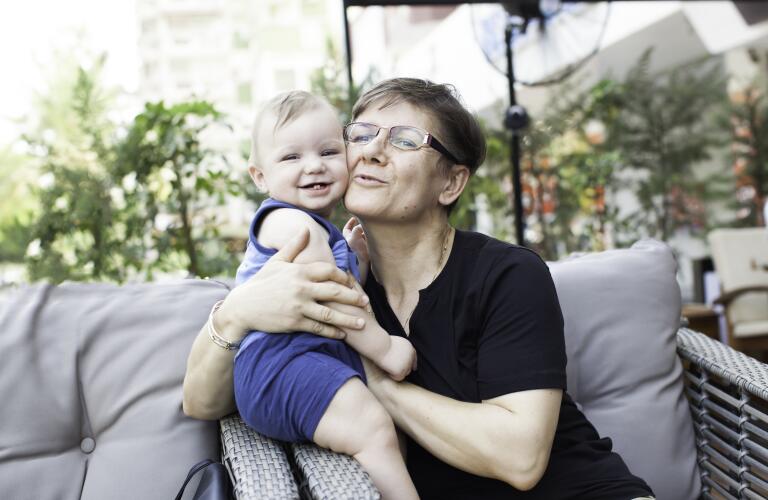Must I Get a Tdap Vaccine to Hold a New Baby

Getty
As you're busily preparing to welcome a new grandchild into your life, there's one more plan you need to make—a visit to your doctor for updated vaccinations. Because that little bundle of joy is especially vulnerable to infection, it's important for everyone doting on the new baby to be vaccinated against certain diseases.
As newborns, babies are too young to receive all their immunizations, and sometimes vaccines require two or more doses several months or even years apart before the child is fully protected. Even if you were vaccinated as a child yourself, it's important to get a booster, which will protect your health too.
Some contagious diseases for which there is a vaccine are especially dangerous for newborns, so you will want to update your immunizations for those in particular. Other diseases have been nearly eradicated from the United States, but to safeguard babies and other vulnerable people who aren't healthy enough to be inoculated, make sure you're immunized. Talk with your doctor about health conditions you have, such as allergies that would make any vaccinations unsafe for you.
The most important vaccines for grandparents to update include the MMR, Tdap, shingles, pneumonia, and flu vaccines.
Measles-mumps-rubella (MMR) vaccine
Measles is a highly contagious respiratory infection that starts off with fever and cold symptoms. After a few days, the characteristic red rash appears on the skin, but by that time, anyone around the infected person who hasn't been immunized has a high chance of contracting the disease.
People born before 1957 are usually immunized because they likely either had measles or were exposed to it as a youngster. Grandparents born after 1957 should talk with their doctor about getting a booster shot. The MMR vaccine also protects against mumps and rubella, two other contagious viral diseases.
Tetanus, diphtheria and pertussis (Tdap) vaccine
Also known as whooping cough, pertussis is a highly contagious respiratory infection that is relatively common in the United States. Babies are by far more likely to contract the disease from a family member, and they have about a 50% chance of ending up in the hospital if they develop whooping cough. While it's uncommon, whooping cough can be fatal in infants.
Shingles vaccine
Shingles is characterized by a painful rash neurologic complications and is fairly common among adults—about a third of people will develop shingles in their lifetime. Children aren't in danger of getting shingles during childhood, but the virus that causes shingles also causes chickenpox. So, if you have shingles and play with your non-vaccinated grandbaby, the infant could contract chickenpox. Plan ahead because you should also wait 14 days after receiving the shingles vaccine to visit with grandchildren to avoid accidentally transmitting chickenpox to children.
Pneumonia vaccine for pneumococcal diseases
Bacterial pneumonia is a lung infection that can happen to anyone but is most severe among babies, young children, and older people. To protect your grandchild—and yourself—against it, get a pneumococcal vaccine. The vaccine protects against Streptococcus pneumonia, which can also cause life-threatening infection of the blood and the brain and spinal cord (meningitis).
Flu vaccine
While you'll want to get vaccinated every season against the flu to prevent serious illness, it's especially important if you have a newborn grandbaby to hold. Infants younger than 6 months are too young to be vaccinated against the flu, so by getting the immunization yourself, you're also helping to protect your grandchild.
COVID-19 Vaccine
The worldwide epidemic of COVID-19 (coronavirus disease 2019) ushered in a new vaccine to help fight the viral disease. The SARS-CoV-2 virus infection causes no symptoms in some people, while others suffer severe respiratory complications and some die. Anyone 16 and older is eligible to receive the COVID-19 vaccine. Babies and young children are not yet eligible, so it's important for new grandparents to get vaccinated to help protect the young.
Vaccine timing: Get your shots well before your new grandchild is born.
If it's your first time getting any of these vaccines, be sure to get them well in advance of your grandchild's arrival. For example, to protect against whooping cough, you should get the Tdap vaccine at least two weeks before meeting the newborn. Some vaccines, including MMR, require two doses spaced at a specific interval to develop an effective immune response. Guidelines for pneumococcal vaccination require doses one year apart.
It takes time for your body to build immunity after receiving a vaccine. To achieve the greatest immunity and protection from contracting and spreading these diseases, see your doctor now to verify if you are up to date on your vaccinations. Your doctor will determine the right immunization schedule for you based on your overall health and medical history.
Must I Get a Tdap Vaccine to Hold a New Baby
Source: https://www.healthgrades.com/right-care/vaccines/vaccines-all-new-grandparents-need
0 Response to "Must I Get a Tdap Vaccine to Hold a New Baby"
Postar um comentário